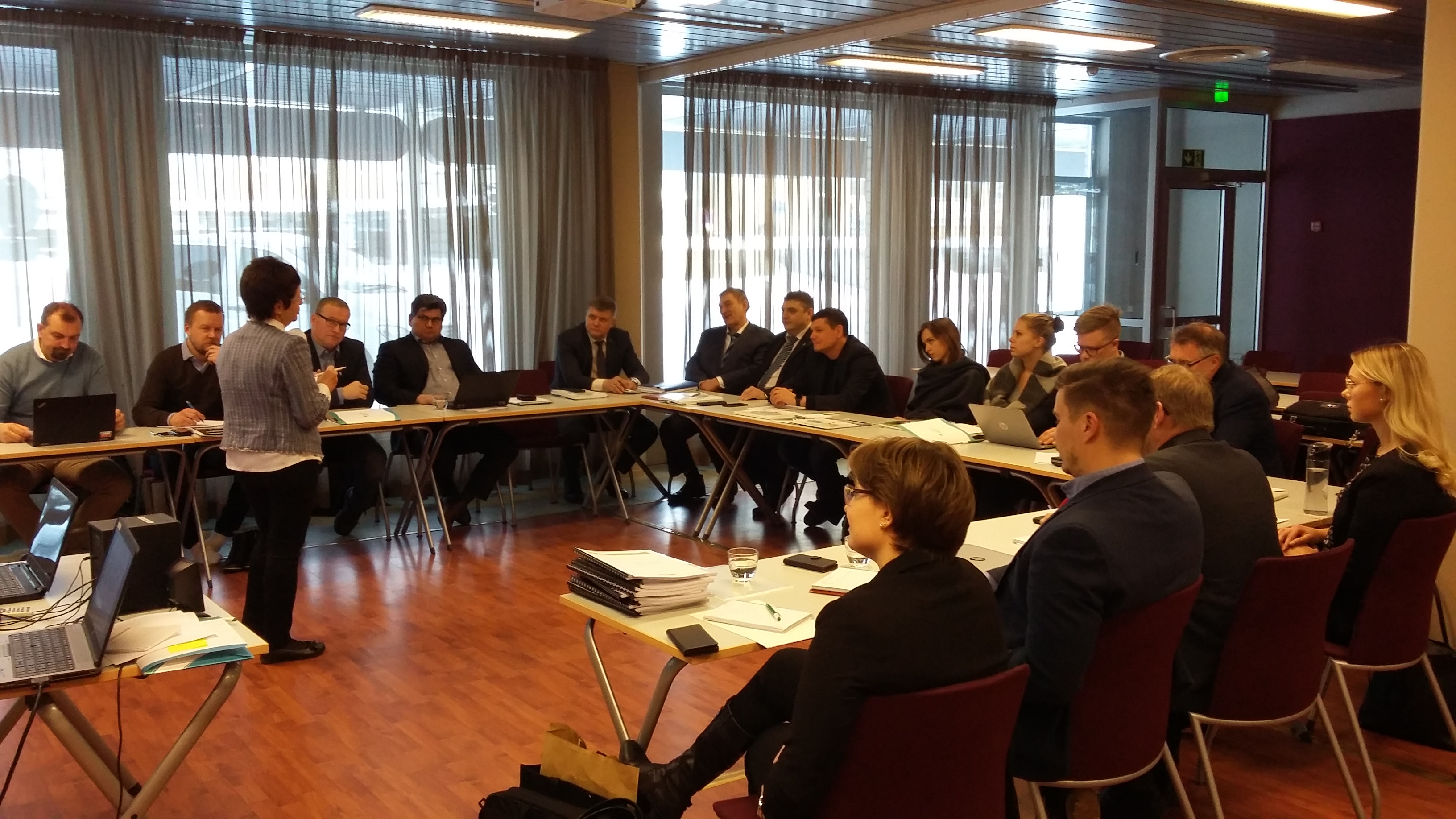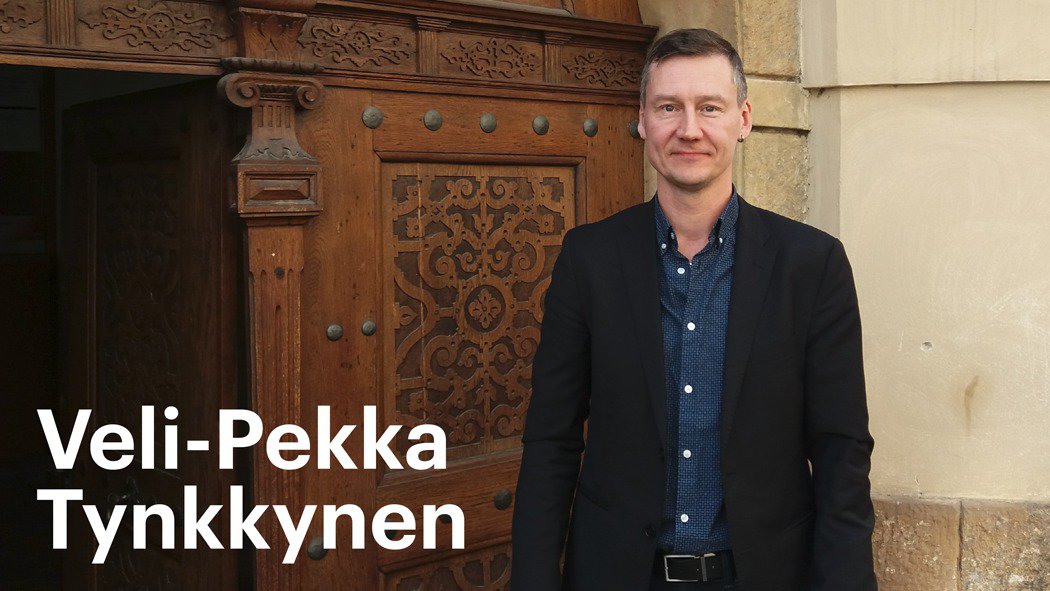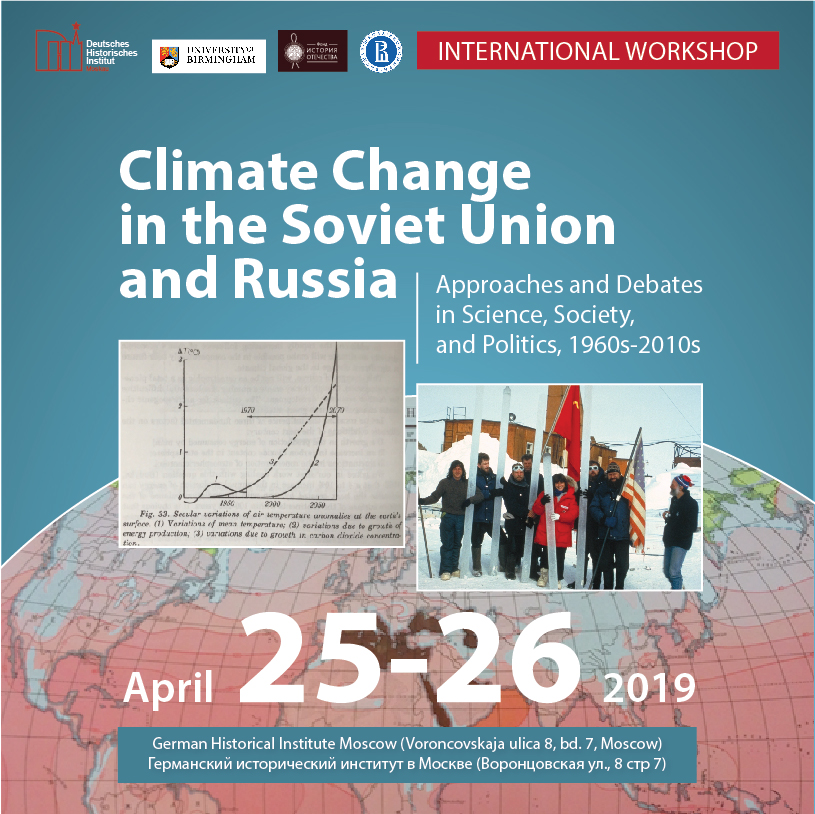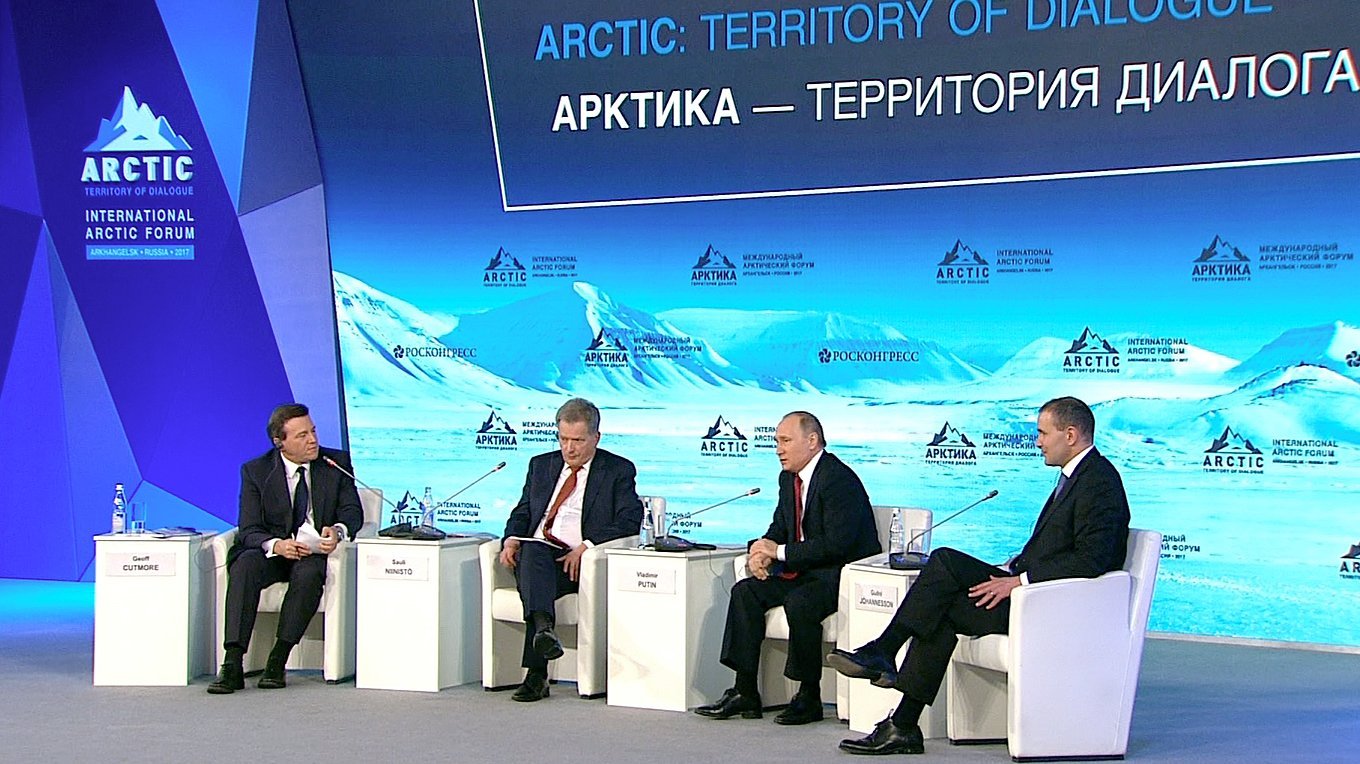Today Professor Tynkkynen commented on the issue of Russian oil impurities at Ykkösaamu radio programme on YLE Radio 1. The recording of the programme is available online, Professor Tynkkynen’s interview starts at 54:00.
Workshop on Climate Change in the Soviet Union and Russia organised in Moscow
On 25-26th of April “Climate Change in the Soviet Union and Russia: Approaches and Debates in Science, Society, and Politics, 1960s-2010s” workshop is organised in Moscow by the German Historical Institute Moscow. Professor Veli-Pekka Tynkkynen is taking part in it, presenting his and Dmitry Yagodin’s paper “Regionalization of climate policies in Russia – local reality meets the national climate-denial narrative”.
Despite the Soviet Union’s role as a Super Power during the Cold War period and Russia ́s size
and geopolitical importance today, still relatively little is known about how the country’s
government, scientists and people have dealt with and responded to natural/anthropogenic
climate change. This interdisciplinary workshop thus aims to understand how attitudes towards
climate change in the Soviet Union/Russia have evolved over time and simultaneously been
shaped by various actors.
More information is available online.
Science Media International Forum
Tomorrow our postdoctoral researcher Dmitry Yagodin will be taking part in a round table discussion “Арктика в фокусе медиа” (Arctic in the media focus) at St. Petersburg State University, Russia. Event is a part of Science Media International Forum “Media in Today’s World. St. Petersburg readings”.
At the round table the questions of “Arctic as a sphere of interest of many states: cooperation and conflicts” and “Representation of the topic of Arctic territories exploration” in the world mass media” will be discussed. More information about the round table can be found here.
Jussi Huotari reflects on the Arctic: Territory of Dialogue forum
Last week our doctoral researcher Jussi Huotari attended the International Arctic Forum, which was organised in St. Petersburg on 9-10th of April. Read his reflection on the high-profile event from a first-hand perspective.
Continue reading “Jussi Huotari reflects on the Arctic: Territory of Dialogue forum”
Jussi Huotari moved to a new position as project manager at the “Barents Region Transportation and Logistics, BRTL” project
A member of our research group, PhD candidate Jussi Huotari was selected as project manager to Kolarctic CBC funded “Barents Region Transportation and Logistics, BRTL” project. The BRTL project focuses on producing and analysing timely information on the development of transportation corridors and logistical solutions from the regional perspective. It ponders around questions such as what is regional preparedness to adapt state-level climate targets and development of intelligent transport systems (ITS).

This is challenging but yet highly interesting project” says Huotari, “since we have 13 partner organizations from all four Barents region countries involved in the project, interests are multiple and diversified. On the other hand, the BRTL is a good test for Barents cooperation, particularly now when several states have announced ambitious climate policy goals, but the capacity and willingness to implement national climate targets in the regions varies a lot. As a project manager my goal is also to increase cooperation and dialogue between academia and public policy institutions since there is a strong demand for information in the regions. I also believe that fostering this kind of dialogue would benefit both regional authorities and universities. The project brings added value to my own research as it brings me closer to political processes at the practical level.
More information about the BRTL project.
Sakari Höysniemi on Winland’s ending seminar
The ending seminar of From Failand to Winland project was held on Wednesday in Finlandia hall in a conference room full of crowd. Project’s participants from our group, doctoral candidate Sakari Höysniemi and Professor Veli-Pekka Tynkkynen attended the seminar, professor Tynkkynen also took part in the peaker at the “Tutkimuksen yhteiskehittäminen ja tutkimuksella vaikuttaminen” (Collaborative research and research influencing) panel. Sakari Höysniemi shares his experience of working in the Winland project and attending its final seminar.
Thank you for 2 years of @WinlandFI research! 40+ scientific articles, 9 events but networks made are not easy to measure #impact #research pic.twitter.com/YJuIvVyZFm
— Outi Kuittinen (@Outikookoo) April 10, 2019
Vaikuttava ja vakuuttava #tiede vaatii rakentavan vuoropuhelun mahdollistamista ja harjoittelua, resursseja sekä perustutkimukseen että yhteiskunnalliseen vuorovaikutukseen ja jälkimmäisen arvostamista – @KaisaLSmith @ValtonenVesa @VPTynkkynen @kmlonkila.#strateginentutkimus pic.twitter.com/zB3KQkZNVg
— WinlandFI (@WinlandFI) April 10, 2019
The project has explored during the last two and a half years Finland’s future food, water, and energy security. The work was governed by Water and Development research group from Aalto University’s School of Engineering under energetic, supportive and multidisciplinary leadership of Marko Keskinen and Suvi Sojamo. I reckon the project would not have been as successful as it was without the multidisciplinary experience of the two that also influenced other consortium partners to cooperate not only in workshops and seminars, but also in actual research. I haven’t seen too many projects where environmental engineer and pedagogic researcher or political scientist, geographer and energy engineer would write an article together.
The work was divided into seven different subprojects of which my work was dedicated mostly to Energy policy subproject under the head of Veli-Pekka Tynkkynen, where we looked at how energy security is being envisioned both in Finland and in Russia and what kind vulnerabilities, interdependencies or risks may emerge but also what possibilities and opportunities there are to improve our current situation.
Energy is not an island. Great briefs on necessity of comprehensive view on #energysecurity by @WinlandFI https://t.co/1XoUq24Syz pic.twitter.com/FGCVYMcEho
— CommittedEnergy (@CommittedEnergy) April 10, 2019
One of our key results thus far is that although around 63 percent of Finland’s energy exports come from Russia (oil, natural gas, coal, uranium and biomass) such dependence does not bring an acute energy security threat if we understand energy security in techno-economic terms as security of energy supply in exceptional situations. In such situation any of the mentioned energy form could be purchased elsewhere. However, according to social scientific research on energy it is a lifeblood of our societies and it influences societal development in any temporal context. In ordinary situation Finland or Finnish companies would not stop purchasing energy from Russia, as their production or supply chain is optimised for Russian energy, that is it would be more expensive to shift permanently to another supplier. The latter understanding gets often neglected in Finnish public debate. It is, however, relevant to take this perspective into account in the anticipation of needed sustainability transition, as incumbent regime actors are likely to resist change.
Furthermore, Finland’s internal energy security arrangements are likely to be reassembled. For instance, wind power has become the cheapest form of electricity, and its perception has transformed from threat to electricity system to enabler of increased self-sufficiency that still needs mechanisms to accommodate its volatility. This also likely to change actor landscape to include more and smaller scale actors that can make governance of security of energy supply more complex.
Although we already had the final seminar our work is still continuing until the end of this year. Also, a master’s student, Lauri Lähteenmäki will contribute to the subproject as he currently work on master’s thesis on Yamal LNG project that will as a case study improve our understanding of the relationship between energy security and energy transition in the context liquified natural gas.
More information on the seminar can be found on Winland’s website and blog entry.
Guest column at The Ulkopolitist
Sanna Kopra, together with Tiina Vaittinen, Mikko Räkköläinen and other members of the board of Finnish Peace Research Association, wrote a guest column “Suomi profiloituu konfliktinratkaisun suurmaana, mutta rauhantyöstä on leikattu viime vuosina tuntuvasti – Kuinka käy ensi vaalikaudella? Puolueet vastasivat 3 kysymykseen” (Finland is expertising as a major conflict resolution state, but peace work has been severely cut in recent years – How will it be in the next parliamentary term? The parties answered 3 questions) for The Ulkopolitist.
As the issues of peace work have been left out of the election debates, the author of the column asked major parties’ leaders and representatives 3 questions: 1) How high do you think peace and conflict research and peace mediation should be in the Finnish foreign policy priority list during the next parliamentary term? 2) What is your party ready to do in order to preserve the peace expertise and conflict research in Finland in the future? 3) What do you think are the biggest challenges for peace mediation at the moment and how will your party respond to them during the next term?
With elections coming already this Sunday, the column is of special interest for the voters. You can read the guest column on The Ulkopolitist website.
Karoliina Hurri was awarded research grant for the second year of her study project
Our doctoral student Karoliina Hurri was awarded research grant for the second year of her study project, which investigates the construction of China’s Leadership role in international climate politics. The grant is a follow-up to her 2018 “Climate, Change” –grant from the Tiina and Antti Herlin Foundation. The goal of the “Climate, Change” grants is to seek ways to provide research data to support public debate and decisions, and to find new solutions to the most alarming changes in the climate, as well as to create more ways of preventing them in the future, both at the individual and society level.
The Board’s grant decisions support several different areas of scientific research which aim to prevent the ongoing climate change, find ways of how to adapt to it or to clarify factors leading to global warming.
Congratulations, Karoliina!
Veli-Pekka Tynkkynen’s interview in Czech for Info.cz
Last week Veli-Pekka Tynkkynen visited Prague to give a lecture at the Institute of International Affairs. During his stay in Czech Republic, Professor Tynkkynen also gave an interview for Info.cz, which is now published in the article “Jak oslabit Putinův režim? Musíme Rusko donutit k přechodu na obnovitelné zdroje, říká expert” (How to weaken Putin’s regime? We have to force Russia to move to renewables, says the expert)

Russian Rosatom is not an energy company, it’s like a ministry, says Veli-Pekka Tynkkynen from the University of Helsinki. Therefore, the energy and environment expert would definitely not recommend entrusting Temelín* to this company. He came to Prague at the invitation of the Institute of International Relations.
* Temelín is a nuclear power station in Czech Republic.
The interview can be read in Czech online.
Lecture “Energy, Climate Change & Comprehensive Security in the EU-Russia-US relations” today at the Metropolitan University Prague
Today Professor Veli-Pekka Tynkkynen is giving a lecture “Energy, Climate Change & Comprehensive Security in the EU-Russia-US relations” at the Metropolitan University Prague, Czech Republic.
Energy security is typically understood as either security of supply (“EU perspective”) or security of demand (“Russian perspective”). The lecture will discuss future relations between the EU, Russia as well as the USA via the prisms of spatialities, geoeconomics and commodity chains of different energy sources in the EU – Russia energy constellation. Changing global climate is the contextual factor that compels to incorporate the perspective of comprehensive security into the traditional energy-security considerations, but it also opens avenues for mutually beneficial foreign relations. The lecture ponders possibilities to move from the asymmetric “energy as a weapon” perspective to a symmetric “energy as a tie“.
Structure of the lecture:
- Energy security perspectives in EU – Russia energy trade (EU, Russia, USA)
- Spatialities of energy and societal development
- Climate change and comprehensive security
- Promoting responsibilities along energy commodity chains via symmetric energy relations
- Certified flows of energy enhance mutually beneficial (energy) futures and foreign relations
European powers think they have more leverage than they actually do when it comes to countering Russia’s monopolistic tactics in the energy industry @VPTynkkynen said at a recent lecture. pic.twitter.com/dYhQIkuwLs
— ÚMV Praha (@IIR_Prague) 5 апреля 2019 г.
More information is available at the University’s website.



